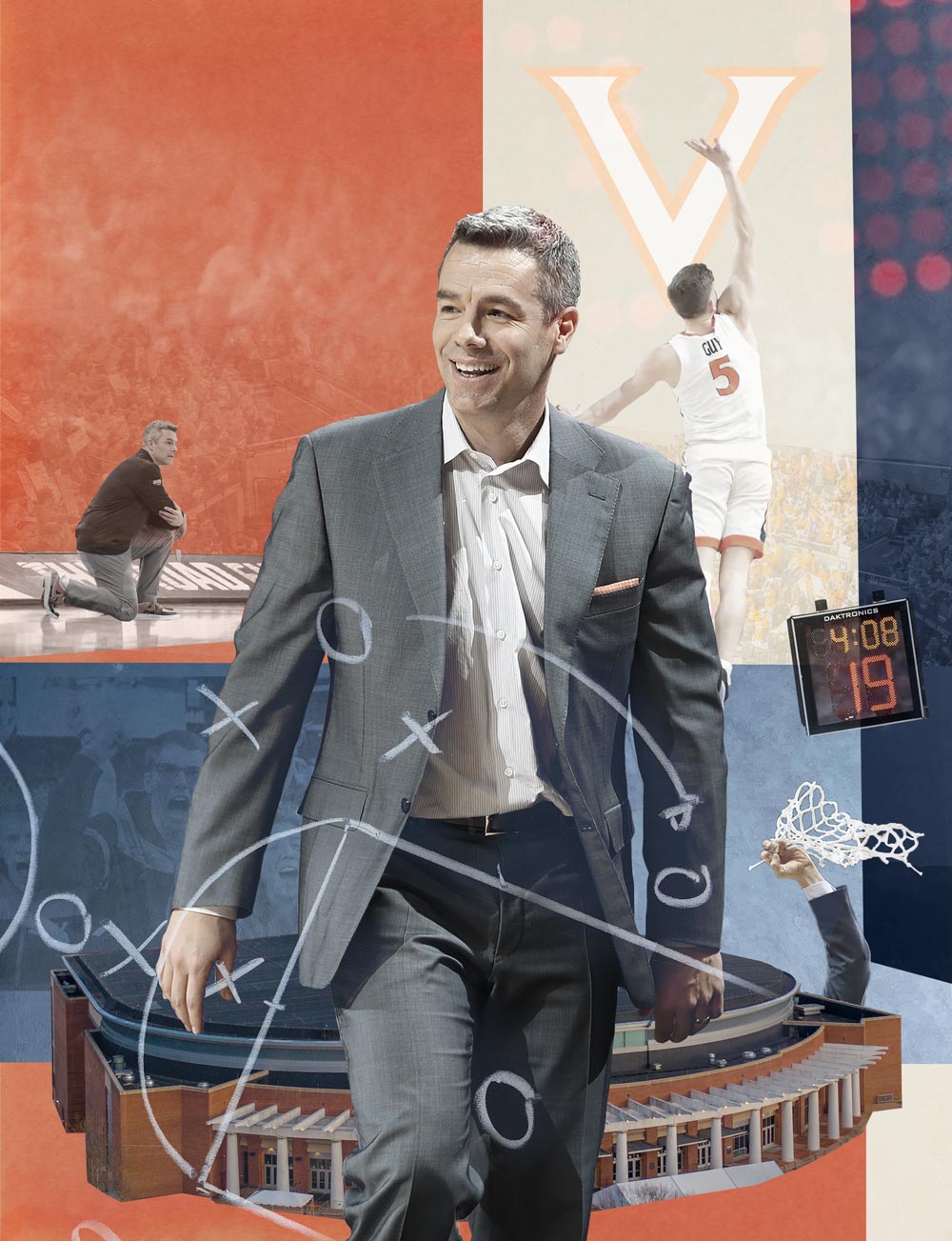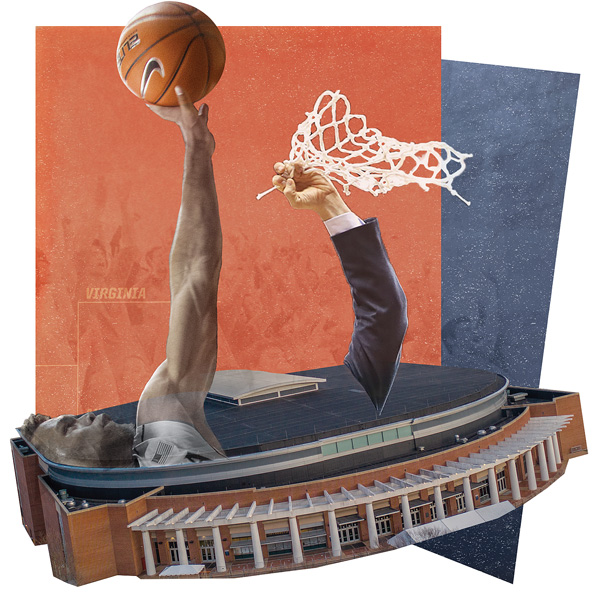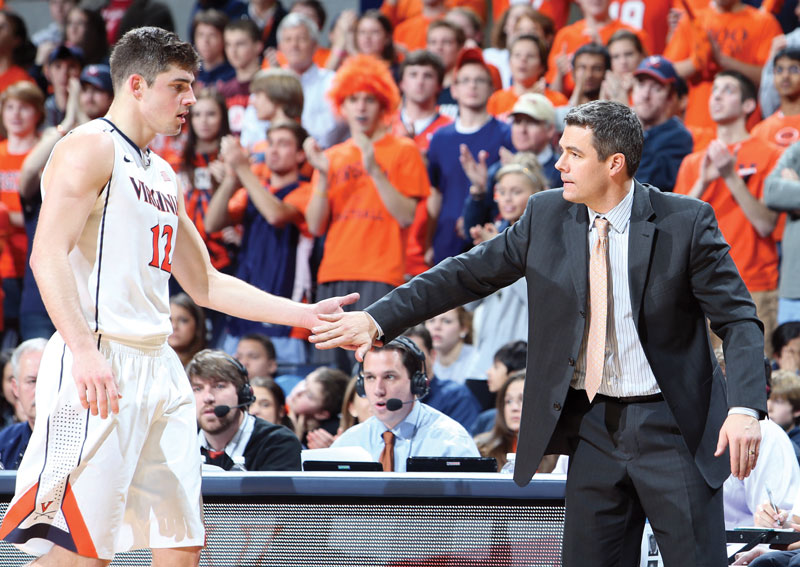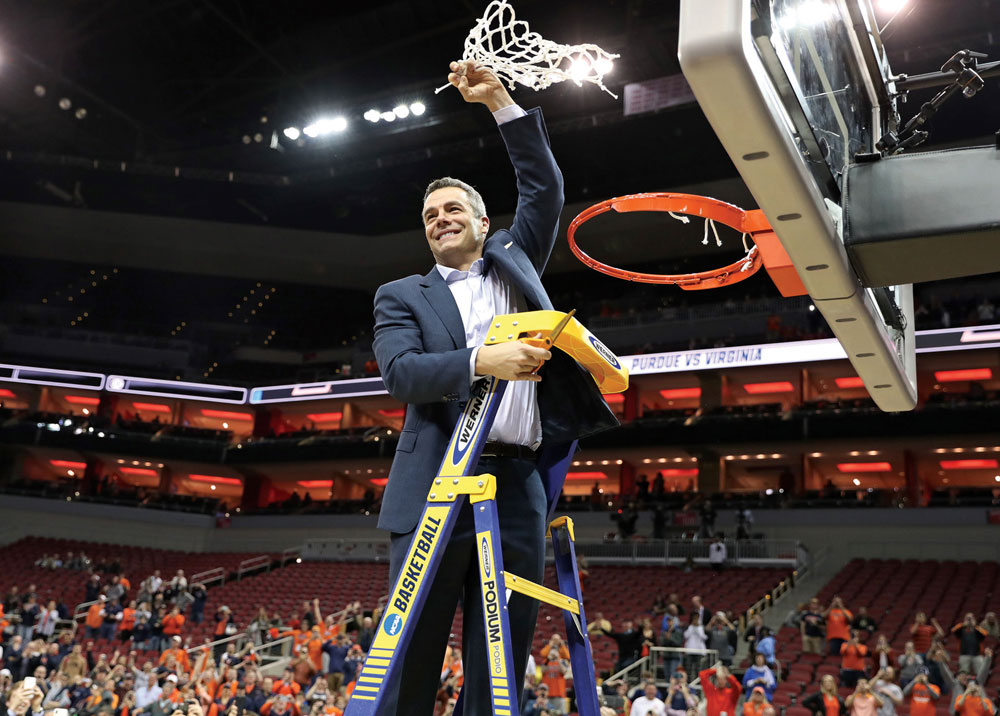Bennettball
To get a look at UVA’s all-time winningest coach, we played by his rules

Writing about Tony Bennett, Virginia’s widely admired men’s basketball coach, can be a bit like playing against his team’s tightly packed defense. With direct access cut off, you have to work the perimeter.
One of the tenets of Bennett’s personal belief system is that he does not engage in self-promotion. It came as little surprise, then, that Bennett declined our request for an interview, as he does with most others outside press conference settings.
“Coach isn’t interested in doing any features on himself,” wrote Erich Bacher, who manages media requests for the UVA team, in an email breaking the disappointing but unsurprising news. “I hope you understand, but that’s just Coach.”
We do. But we keep trying. Bennett reached a pair of significant milestones last season. In January, he won his 327th game at UVA, passing Terry Holland to become the school’s all-time winningest coach. Two weeks later, Bennett won his 400th game overall, a total that includes a three-year stint at Washington State University.
With the recent retirements of several giants of coaching from the generation before his—Jim Boeheim of Syracuse University, Mike Krzyzewski of Duke University and Roy Williams of the University of North Carolina—Bennett is now the ACC’s second longest-tenured coach, behind Florida State’s Leonard Hamilton. He’s also the league’s most accomplished coach. A three-time national coach of the year, he’s one of just six active coaches in the nation to have won a national championship, and the only one from the ACC to have done so.
As Bennett, 54, begins a new career chapter and takes his place as a coaching elder, if you will, it seems a good time for a refresher on Bennettball, and the man behind it. Given his visibility and all he’s accomplished, at this moment he is as recognizable a symbol of UVA as any single individual.

We offer this look, if only as a refresher, at how Bennett has gone about his business and arrived at iconic status, in a uniquely Bennett way.
Embrace the pace
Not everyone is a fan, but Bennett hasn’t wavered from a distinct style of play. On offense, his teams are patient and deliberate. On defense, they deploy in a sagging “Pack Line,” which clogs the lane near the basket, seeking to wall it off. The combination makes for a slow pace, hence the critics.
Last year the Cavaliers ranked 360th of 363 Division I teams in tempo of play. The year before, UVA was 357th of 358 teams. (In the ultimate proof that even slower can be better, UVA’s 2019 national championship team ranked last in the nation in tempo.)
Tell it like it is
Bennett’s been a straight shooter since the day he arrived at Virginia.
Former Cavalier player Will Sherrill (Col ’11) was in the room the first time Bennett addressed the Virginia team. He remembers it as much for what Bennett didn’t say as what he did, he says.
“He didn’t come in and try and be intimidating. He didn’t come in and say, ‘My way or the highway.’ He didn’t come in and try to sell us. He just plainly and clearly laid out his views of how he was going to build the program, and said he hoped all of us would get on board.
“That was it. It was such an understated and frankly vanilla speech. But you could tell he genuinely believed it. I walked out of that meeting fairly convinced that he was the right guy for the program.”
Others weren’t as sold. It’s common for players to transfer after a coaching change, but in Bennett’s case, the revolving door continued even after he began getting his own guys. Four of the six members of his highly touted first recruiting class finished their careers elsewhere. (Then, unlike now, players were required to sit out a season after transferring, so not as many did.)
From the outside, it may have been hard to reconcile the spate of player departures with Bennett’s nice-guy image. But Ritchie McKay, a former UVA assistant who is now head coach at Liberty University, says it was just a product of Bennett’s uncompromisingly honest approach.
“Tony didn’t run guys off,” McKay says. “He was about fairness, but he was also very real with guys. He would not promise, even the best of them, that they were going to play this many minutes or have this particular role.
“Some guys were a little dissuaded by not hearing what they wanted to hear or were not willing to go through that hard work.”
Adds Sherrill: “The thing about Tony is he hopes that you’re going to be on board, but he’s not going to beg and plead. He wants players that are bought in of their own volition.”
Bennett eventually found them, now-familiar names such as Joe Harris (Col ’14), Malcolm Brogdon (Col ’15, Batten ’16), Mamadi Diakite (Col ’19), Kyle Guy (Col ’20), Kihei Clark (Col ’22) and others who appreciated Bennett’s honesty and fueled the rise of the program.
“He’s the most genuine coach I’ve ever had,” Clark said last season, echoing a sentiment expressed by other players.
Find the Rocky Balboas
Unlike rivals Duke and North Carolina, Bennett recruits fewer of the highest-ranked “can’t-miss” prospects—players who might stay in college just a year or two before going pro—and instead goes after less-heralded players who are likely to stick around.
He is looking for guys with chips on their shoulders, assistant coach Jason Williford (Col ’95) said during a video interview posted on the Locker Room Access website, a platform founded by former UVA players Justin Anderson (Col ’16) and Ty Jerome (Col ’20). Bennett seeks players who are not unlike a certain fictional boxer, played in the movies by Sylvester Stallone, Williford said.
“Tony always says, ‘I want guys like Rocky, who just want a shot at a title fight,’” Williford said.
The approach, which emphasizes player development, has paid off. Virginia has finished first or tied for first in the ACC regular season standings six times under Bennett. North Carolina has finished or tied for first five times and Duke twice over the same period.
Live your faith, but don’t impose it
You cannot attempt to explain Bennett’s methodology without mentioning his strong religious faith. His beliefs are baked into the program. It is built on five faith-based pillars—humility, passion, unity, servanthood and thankfulness—that Bennett’s father, Dick, used as guideposts during his own coaching career.
Bennett will expound on his beliefs if asked, particularly for an inquisitor like former UVA football coach Bronco Mendenhall, a man of faith himself who interviewed Bennett on a recent podcast. On another podcast, though, Bennett emphasized that when people ask him what’s important, he’s careful to frame his answer with “gentleness and respect.”
“Everyone is at a different place with what they believe and don’t believe, and you have to respect that, especially being at a state institution,” Bennett said on a separate “Locker Room Access” episode. “Our program is based, regardless of your beliefs, on teachings that relate to basketball.”
Be grateful for hard gifts
UVA’s loss to the University of Maryland, Baltimore County, in the 2018 NCAA tournament was, by virtually any measure, the lowest point of Bennett’s career. It was, as UVA fans know, the first time in tournament history that a No. 1 seed fell to a No. 16.
Bennett’s post-game interview, however, is hailed as one of his shining moments, an ultimate demonstration, considering the gut-wrenching circumstances, of grace, class and perspective.
Just minutes after the game, Bennett left an emotionally distraught locker room and spoke with television reporter Tracy Wolfson.

“It stings,” he said. “But I’m trying to tell the guys in there: ‘This is life. It can’t define you. You enjoyed the good times and you’ve got to be able to take the bad times.’”
Post-game interviews of losing coaches, an often-awkward ritual, are rarely memorable. This one was an all-time exception.
“That touched more people in our profession than anything he could have said after winning the championship,” McKay says.
Says Dan Bonner (Col ’75), a veteran college basketball analyst and broadcaster, and former UVA women’s basketball coach: “If you weren’t a fan of Tony Bennett before that happened, you’re crazy if you weren’t a fan of him after it happened.”
Bennett told Mendenhall that, perhaps not surprisingly, the loss caused him to do some soul-searching. He concluded that if he could handle such a devastating professional setback, he could deal with anything coaching threw at him.
“I’ll still be OK,” he said on the podcast. “I still love the game, I still have my wife and kids, I still ultimately have my faith, which gives me my peace and perspective beyond what the world says.”
The realization was liberating. It paved the way for what came the following season, Bennett said.
“I don’t know if we would have won a national championship the next year had we not gone through that so-called humiliating or painful gift, however you want to look at it, that loss.”
Compete with a smile
Beneath Bennett’s genial exterior is the heart of a fierce competitor.
“Tony’s one of the most competitive people I know,” says Kyle Getter, a former UVA assistant coach now at the University of Notre Dame. “I don’t think outwardly that probably shows.”
Says Liberty University’s McKay: “There’s a booth that he goes into and changes from Clark Kent to Superman.”
McKay has seen the transformation during UVA games, and even in friendly games of pingpong, where Bennett is a veritable ninja with a paddle, several people said.
“He’s elite,” McKay says. “Part of his elite-ness is if you win a game, you’re staying there until he has a one-game advantage.”
Not that Bennett will rub it in. Getter recalled one memorable match, when a high school recruit came to Bennett’s home for a visit and a game of pingpong.
Bennett, who is left-handed, played the recruit right-handed to make the game more competitive and to spare the young man’s feelings, Getter says.
“He didn’t tell him,” Getter says. “The kid thought he was pretty good at pingpong.”
In changing times, double down on what’s important
These are volatile times in college basketball. Recent rule changes on player transfers have created something approaching free agency in the sport, with a record 1,134 players across the nation seeking to switch schools in 2023. The ability to pay top players six or even seven figures through name, image and likeness deals has spawned a new, loosely regulated recruiting marketplace.
Both developments are challenging traditional notions of how to build a team. Is there anyone more traditional than Bennett? How will he navigate this new landscape?
“You have to adapt and adjust,” he said at an October press conference. “But as in life, as in anything, there are certain things that are your bedrocks, your cores, and those don’t change.”
Virginia has jumped into the NIL space, setting up a collective, Cav Futures, that educates athletes on how to market themselves and matches them with interested companies. UVA, however, won’t get in bidding wars or accept demands from players seeking a certain dollar amount to sign with the school, Deputy Athletics Director Edward Scott said at a recent forum on NIL.
Bennett stopped recruiting one player who made such a demand, Scott said.
As for transfers, Bennett has said he will take those who fit academically and buy into his program’s culture, as he’s always done. He’ll look for the kids with chips on their shoulders.
“We get to choose how we run our program,” Bennett told Mendenhall. “It may be harder in some ways to be successful…. [But] you get to choose how you want to do it, and we said, ‘Let’s double down on what’s important.’
“If it’s enough, it’s enough,” he added. “If it’s not, at that time we’ll address it and adjust. I don’t know many other ways to do it where I can be successful, or I can be successful in the right way. So that’s what we’re going to try to do.”
Broadcaster Bonner says he doesn’t doubt that Bennett will figure it out, without compromising his standards. “Time will tell,” he says. “But I have every confidence that Tony and his staff will do everything possible to make it work.”
April 1, 2009: Tony Bennett is introduced as Virginia’s men’s basketball coach, replacing Dave Leitao, who resigned in March. Bennett comes from Washington State University, where he was voted national coach of the year in 2007. In three seasons, Bennett led the Cougars to two NCAA tournament appearances and compiled a 69-33 record, the best over a three-year period in school history. “I came here to build a great team,” Bennett says. “But more importantly, I came here to build a program that lasts.”
2010: Bennett’s first UVA team finishes with a record of 15-16, an improvement of five wins over the previous season.

2011: UVA finishes 16-15, its first winning season since 2008.
2012: Bennett leads UVA to a 22-10 record and its first NCAA tournament appearance since 2007.
2014: UVA wins the Atlantic Coast Conference regular-season and tournament titles and advances to the NCAA tournament Sweet 16 for the first time since 1995.

2015: Bennett is voted national coach of the year by the United States Basketball Writers Association. The Cavaliers finish 30-4, their second-straight 30-win season.
2016: Virginia finishes 29-8 and reaches the Elite Eight of the NCAA tournament for the first time since 1995.
March 16, 2018: The Cavaliers earn the No. 1 overall seed in the NCAA tournament, but in one of the biggest upsets in tournament history, fall 74-54 to No. 16 seed University of Maryland, Baltimore County. It’s the first time a No. 1 seed has lost to a No. 16.

April 8, 2019: UVA defeats Texas Tech University 85-77 in Minneapolis to win the NCAA championship, completing what ESPN terms “the most redemptive season in the history of college basketball.”
January 7, 2023: Bennett wins his 327th game at UVA, surpassing Terry Holland to become the winningest coach in school history. He credits the players, assistant coaches and staff who have stayed true to the vision he outlined 14 years ago. “When you keep staying together,” he says, “good things happen.”
